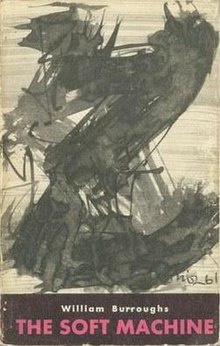The Soft Machine

First edition
|
|
| Author | William S. Burroughs |
|---|---|
| Country | United States |
| Language | English |
| Series | The Nova Trilogy |
| Publisher | Olympia Press |
|
Publication date
|
1961 |
The Soft Machine is a 1961 novel by American author William S. Burroughs. It was originally composed using the cut-up technique partly from manuscripts belonging to The Word Hoard. It is the first part of The Nova Trilogy.
The title The Soft Machine is a name for the human body, and the main theme of the book (as explicitly written in an appendix added to the 1968, British edition) concerns how control mechanisms invade the body.
The book is written in a style close to that of Naked Lunch, employing third-person singular indirect recall, though now using the cut-up method.
After the main material follow three appendices in the British edition, the first explaining the title (as mentioned above) and two accounts of Burroughs' own drug abuse and treatment using apomorphine. Here Burroughs clearly states that he considers drug abuse a metabolic disease and writes about how he finally escaped it.
The main plot appears in linear prose in chapter VII, The Mayan Caper. This chapter portrays a secret agent who has the ability to change bodies or metamorphose his own body using "U.T." (undifferentiated tissue). As such an agent he makes a time travel machine and takes on a gang of Mayan priests who use the Mayan calendar to control the minds of slave laborers used for planting maize. The calendar images are written in books and placed on a magnetic tape and transmitted as sounds to control the slaves. The agent manages to infiltrate the slaves and replace the magnetic tape with a totally different message: "burn the books, kill the priests", which causes the downfall of their regime.
The characters of the Soft Machine fall into three categories:
The Soft Machine has been printed in four different editions, the first three revised by the author, the last by Burroughs scholar Oliver Harris.
Burroughs himself was very displeased with the first edition and this was the main reason for rewriting it so thoroughly: in 1961 he wrote to his friend Allen Ginsberg that he rewrote it extensively while he was working on Dead Fingers Talk, mostly because he was displeased with the balance of cut-up and more linear material. However, his revised editions included much new cut-up material as well as more conventional prose.
...
Wikipedia
